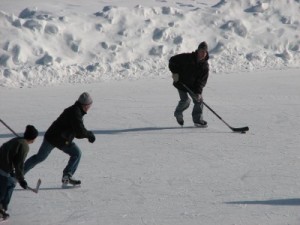
I know I’ve been writing a lot about climate change lately, and I promise that after this post I’ll try to switch it up a bit. But in my defence, for a blog about Canadian science, it doesn’t get any more relevant than this: a group of researchers from Concordia University and McGill University have published the first evidence that climate change is having a measurable impact on our treasured national pastime of outdoor hockey.
Damon Matthews is a climate modeller in the Department of Geography, Planning and Environment at Concordia. He first got the idea to study the impact of climate change on outdoor skating rinks years ago, after someone asked him at a conference if anyone had ever looked at the issue. Other researchers might have laughed it off as a facetious question, but Matthews’s curiosity was piqued. “I started looking, and eventually realized that no-one had actually quantified it, so it was an open scientific question.”
Along with colleagues Nikolay Damyanov and Lawrence Mysak of McGill University, Matthews decided to focus on backyard-style ice rinks, the kind Walter Gretzky famously used to make for his son. These rinks are more uniform than impromptu ones like frozen lakes, ponds or rivers, so there are fewer variables to account for. By calling around to the folks that maintain outdoor rinks in cities like Toronto and Montreal, the team was able to establish that it takes a minimum of three days of temperatures below -5 C in order to build up a good ice base. They defined this as the start of the outdoor skating season (OSS). Nothing lends scientific credibility quite like an three-letter-acronym.
Defining the end of the season was much harder. Some outdoor rinks can survive several days above freezing, but others melt in a matter of hours. It all depends on how many extra layers of ice have been added, and that can only happen when temperatures are below -5 C. Because of this uncertainty, the researchers decided to define a proxy for the OSS as follows: the number of days below -5 C between the start of the season and March 1, when most outdoor rink enthusiasts pack it in for the season.
With their metrics established, the team tackled data from over 140 weather stations across the country. They discovered that in the period from 1951 to 2005, many locations experienced a statistically significant shortening of the OSS. The problem was worst in the interior of British Columbia and southwest Alberta, where the OSS declined by about 20 per cent over the last 50 years. The effect appears to slowly weaken as one moves across the Prairies and into Ontario and Quebec, which saw smaller decreases in the OSS. The Atlantic provinces were a bit of a mixed bag; some locations actually saw increases in the OSS, while others stayed the same or declined slightly. “I didn’t know if we’d be able to detect statistically significant changes going into this study, so I think the strength of the trends we saw over a lot of the country surprised me,” says Matthews. “We are in early days in terms of the impacts of climate change so the fact that we’re able to see some of those impacts already in the OSS was significant.”
Still, it could be argued that the most significant aspect of this study is the way in which it hits so close to home for Canadians, including some for whom climate change is not exactly top of mind. That fact has surely played a role in the ample media coverage of this study, and it’s a point that is not lost on Matthews. “I learned the other day that it was on the front page of the Calgary Herald, which speaks to a certain level of resonance. Global warming is not the most popular issue in Alberta.” Nor is it particularly popular with the Prime Minister, although he is a well-known hockey fan. To me, it doesn’t seem at all far-fetched to imagine that the threat of having no more backyard hockey rinks to nurture the next generation of Wayne Gretzkys will motivate Canadians to tackle climate change in a way that nothing else can.
No comment yet, add your voice below!